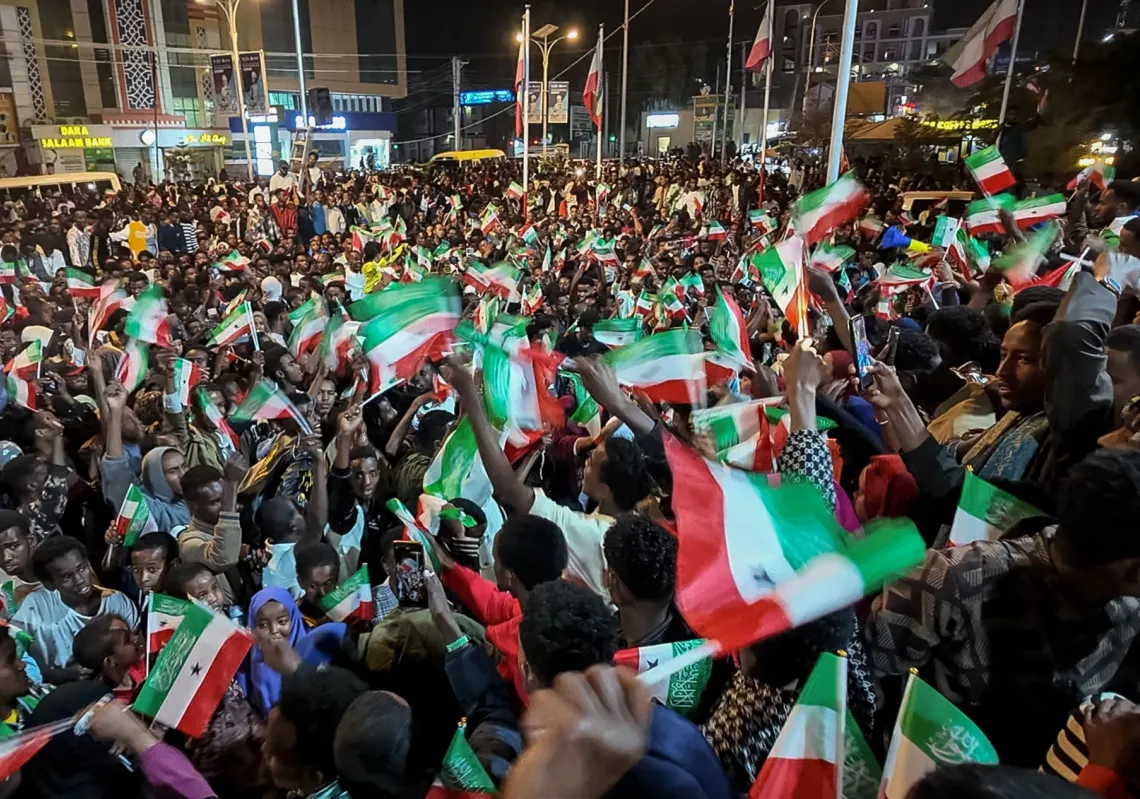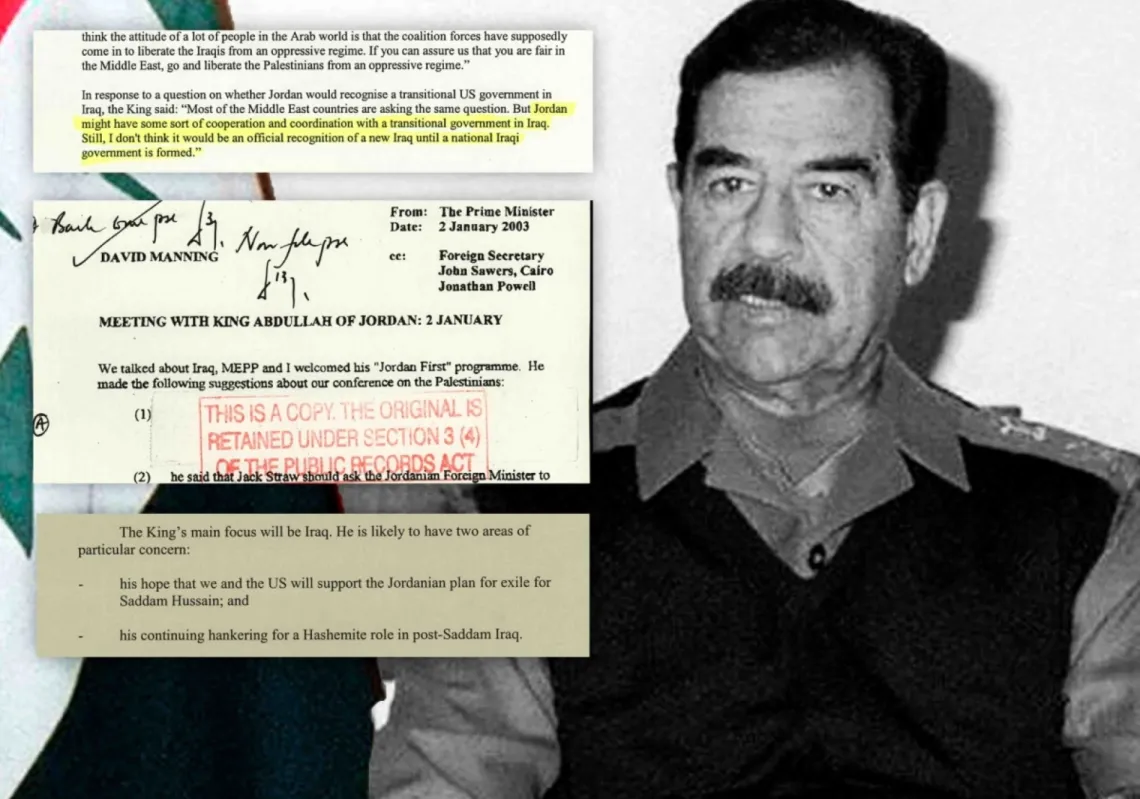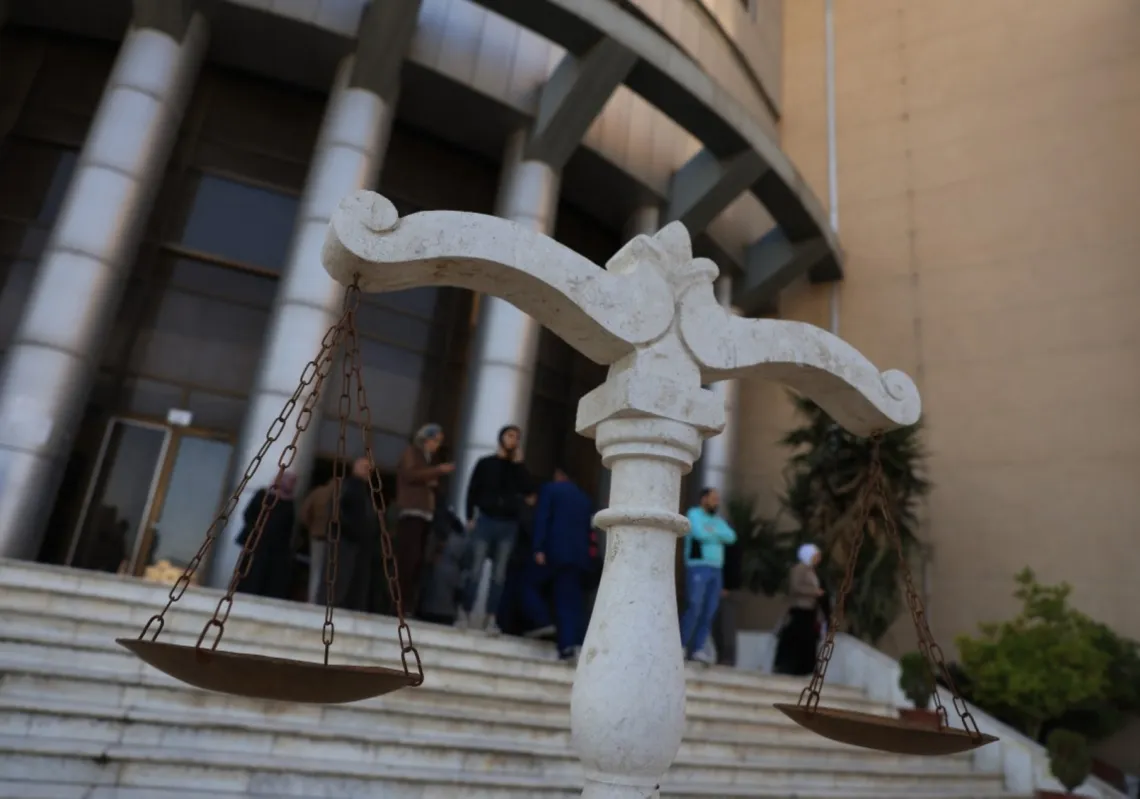Majalla: In his recent visit to the United States, and during his meeting with President Obama, Israeli Prime Minister, Benjamin Netanyahu, presented his vision of a possible solution with the Palestinians. The solution he proposed was based on the management of the crisis, rather than finding a way out of it. He did not raise the subject of the two-state solution. So, is this vision in harmony with the vision of the new American administration regarding peace between the Palestinians and the Israelis?
Dr. Saeb Oraikat: First of all, we appreciate what the U.S. President, Barak Obama, said to the Israeli Prime Minister, Netanyahu. President Obama called for the ceasing of settlement activities, and the implementation of the two-state solution. This has made the position of Netanyahu naked in front of everybody. Netanyahu's government rejects the two-state solution, the signed agreements, and refuses to stop building settlements. Therefore, the U.S. president has two options:
First: To treat Netanyahu as a prime minister who is above the law - consequently, ending all peace negotiations, or any attempt to re-launch the peace process, in addition to throwing the region into a state of violence and chaos, and more bloodshed.
Second: To commit Israel to fulfilling its obligations, in particular the two-state solution, the acceptance of international agreements, and the cessation of settlement activities – consequently opening a new page in the peace process.
I believe that the United States pursues its own interests. The American administration knows very well that its geographical borders are no longer only with Mexico, Canada and other neighboring countries. There are more than 230 thousand US troops in Iraq and Afghanistan. In other words, America's real borders are now with Turkey, Iran, Tajikistan, Uzbekistan, China, Pakistan, the Gulf States, Saudi Arabia, Egypt, and Jordan. This means that there is a new set of American interests. This was confirmed during my recent visit to Washington, as I felt there was something new in their way of thinking. They were talking about a Palestinian state as a high U.S. interest, which means that ending the Israeli occupation has now become part of the American interests. In addition, the way America sees the role of each country in the region has differed greatly from what it was in the past. America no longer needs to protect its interests in the region anymore.
The most important thing is that Washington is now talking about the two-state solution as the only possible option for peace. Therefore they are talking about the responsibilities and interests of all of the countries of the region, in addition to our responsibilities as Palestinians in terms of having a single authority, one lawful arm, and the rule of law. President Mahmoud Abbas has also stressed these things in the context of our true and faithful commitment to fulfilling all of our obligations.
Majalla: Did the new US Administration promise you to exercise pressure on Israel to stop settlements, bearing in mind that the Israeli promises are limited to building random settlements?
Dr Saeb Oraikat: First, I would like to say that according to Hague Covenant (1907), Geneva Accord (1947) and the decisions of the International Law related to the Security Council or the Road Map, there is nothing you can call licensed or unlicensed, legal or illegal settlement. All kinds of settlement are illegal and unlawful. Thus we can say that building settlements in the West Bank and Jerusalem is an illegitimate act. I've heard many US officials say that settlements should be stopped.
Majalla: If the new administration is serious in its endeavours to promote the peace process and exercise pressures on all sides, is it possible that Netanyahu will make concessions to Syria in order to alleviate US pressures upon Tel Aviv and continue blocking peace with the Palestinian side?
Dr Saeb Oraikat: Well, President Mahmoud Abbas told Syrian President Bashar Al-Asad that the occupied Syrian Golan is no less important than the occupied Palestinian territories and therefore liberating Golan is a Palestinian and Arab concern and priority. We stick to the Arab Peace Initiative and will not allow any side to exploit the Palestinian cause at the expense of the Syrian issue and the reverse also holds true.
President Al-Asad explained that the Syrian issue will never work against the Palestinian cause. Therefore, I advise both Israelis and Americans to forget about it.
Majalla: Do you think that the Israeli government is able to deal with the peace process at both sides and is willing to let negotiations succeed in the region?
Dr Saeb Oraikat: I think the existing Israeli government was not elected for making peace either with Palestinians or Syrians. The new Israeli government's main concern is war against Iran. I would like to add that Iran is not a threat to security and peace in the region. Iran lies in the region and we may agree or disagree with it. The real threat is the absence of peace and the continued Israeli occupation. In my opinion, Israel is a threatening nuclear state, not Iran.
Majalla: There are indications of a deal between the US and the Israeli side in which the former would demand from the latter to find solutions for the Palestinian-Israeli conflict to facilitate the US endeavors towards Iran.
Dr Saeb Oraikat: This is not acceptable. The problem is not in Iran or Palestine; the problem is that there is an illegal occupation that violates the International Law and contradicts all its regulations, decisions and covenants. This occupation should be removed. Again, the real threat is not Iran. It is rather the absence of peace and the continued Israeli occupation. There is only one nuclear force: Israel. If the world wants peace and stability to prevail in the region, it should seriously and strictly deal with that issue. It has to announce that all states of the region including Israel are under nuclear disarmament.
Majalla: But the American interests in both Afghanistan and Iraq oblige the US administration to make progress in the peace process between the Israelis and the Palestinians?
Dr Saeb Oraikat: The idea of a Palestinian state did not occur to President Obama overnight,without having considered the American gains from the deal. The US administration is quite sure that there would be no peace, security or stability in the region as long as Israel continues its obstinacy. In short, states often consider their interests before anything else, and that's why the USA tries to make progress in the peace process.
Let us be realistic. The USA has its own interests. I met all prominent figures in the US new administration. I think there is only one voice in America that talks about the "two-state" solution and stopping settlements. We, the Arabs, should do our best to unify our front and to be able to influence the stream of events as much as we are influenced by them. In other words, we should use the language of "interests" with Americans because it is the only language they understand.
Majalla: As you know, the Arab Peace Initiative attempted to end the Arab-Israeli conflict, to normalize relations between the entire Arab region and Israel and recognize Israel as a Jewish nation-state in exchange for a complete withdrawal from the territories occupied by Israel since 1967. Do you think that the US and Israel have agreed to reverse the equation so that the focus will be on demanding Arabs to normalize the relations as a preliminary step to peace.
Dr Saeb Oraikat: Let me say that the Arab Peace Initiative proposed by King of Saudi Arabia which was endorsed in Beirut and re-endorsed in Khartoum Summit, Riyadh Summit, in Damascus (2008) and then in Doha (2009) is unchangeable and irreversible. It is an integral whole. All rumors made against it are just bubbles in the air. The Arab peace Initiative is the most strategic plan proposed by the Arab. It sends a clear message to Israel that we seek peace. But what kind of peace do we want? We want peace in return for Israeli withdrawal from all the Arab territories occupied by Israel since 1967 including Jerusalem, Golan and all other occupied Lebanese territories. Tel Aviv should forget about normalization of relations with the Arab World if it does not comply with these conditions.
Majalla: Is it possible to impose the Arab conditions and demands on the USA and Israel?
Dr Saeb Oraikat: First, these are not conditions or demands. Rather, they are the principles of the International Law. The Arab Peace Initiative, the Roadmap, the concluded agreements and International legitimacy decisions have a shared goal: the peace process aims at ending the Israeli Occupation which started in 1967; resolving all final-status issues including Jerusalem, borders, settlements, refugees, water and freeing prisoners as an integral part of the internationally legitimate demands.
The Arabs proposed their vision of peace. According to the Peace Initiative, if Israel withdraws from the Arab territories which it has occupied since 1967, there will be normalized relations with Tel Aviv. Without withdrawal, no relations will be normalized. Israel is now a force of occupation, invasion, detention, settlement and assassination. An entity like this should not be rewarded at all. If Israel stops settlements, it should not be rewarded for doing so since building settlements is unlawful in the first place. It is against the International Law and the signed agreements. We, the Arabs, depend on the Arab Peace Initiative and will not make any concessions in this regard.
Majalla: Do you think that Netanyahu will set new conditions for negotiations with the Palestinian side? You know that he has recently demanded Palestinian disarmament in the West Bank.
Dr Saeb Oraikat: First, Netanyahu tries to find any excuses. This was very obvious in his meetings in Washington and his recent declarations. He said, "Jerusalem is the everlasting capital of Israel". He rejects the "two-state" solution and denied the signed agreements. He refuses to stop building settlements and wants occupation to continue. Thus the ball is now in Obama and the international community's court. If they continue to deal with Israel as a state above the law, the region along with its peoples will face more violence, disorder, extremism and bloodshed. If Israelis really seek stability, security and peace in the region, they should realize that wars will never be the means to such end. I think the "two-state" solution and compliance with all the signed agreements and drying up the occupation "mess" is the only way to stability, security and peace.
Majalla: If Israelis want to return to the table of negotiations with any Palestinian authority, will they negotiate with the authority of the West Bank, Gaza authority or each of them separately?
Dr Saeb Oraikat: The same question was posed in the recent meeting between Netanyahu and President Obama. Obama asked Netanyahu to accept the "two-state" solution. Netanyhu then asked him with whom he would make peace; the Palestinians in Gaza or those in the West Bank? For this reason, we should surmount our dissensions, division and disunity. We should unify our ranks. We should not wait for others to help us. Hamas is not obliged to recognize Israel as a Jewish nation-state or comply with the agreements concluded with Tel Aviv. This is the job of the Palestinian government. Therefore, we appreciate the efforts made by Egypt and acknowledge Cairo's endeavours to promote the Palestinian-Palestinian dialogue. I stress that this dialogue should be enabled for the benefit of Palestine. A government should be formed to fulfill the commitments of Palestine Liberation Organization, reconstruct Gaza and hold presidential and legislative elections. Our people are democratic. Our decisions are made in the voting boxes and not through fighting and riot.
Again if we do not help ourselves in this regard, no one will lend us a hand.
Netanyahu said that "Jerusalem is the everlasting capital of Israel". This means that the conflict between us and Israel will be everlasting. This is the reality that we should confront. No peace without Jerusalem. Without the Eastern Jerusalem as a capital, the Palestinian state will never exist.
Majalla: How do you face regional parties engaged in the settlement and stability process in the region who insinuated at a Palestinian federalism project between the West Bank and the Gaza Strip?
Dr. Saeb Oraikat: This talk is illogical and unacceptable. The West Bank, Gaza Strip, and Jerusalem are an integrated geographical unit governed by one authority. This is a big Palestinian agony, and a Palestinian calamity. It is the deepest wound that has affected the Palestinian cause since 1967. The division between the Palestinian factions must end, and the interests of Palestine as a state must take the highest priority. Palestine is more important than Hamas and Fateh and all the other factions. In fact, these factions were founded to serve Palestine and not the other way round. This kind of talk is neither logical nor reasonable, or based on anything solid. A Palestinian federation is totally unacceptable. There is only one Palestinian people, and one Palestinian authority. A Palestinian state can not exist without the West Bank, Gaza Strip, and Jerusalem being one geographical unit governed by one authority.
Majalla: The late Palestinian president Yasser Arafat, and after him President Mahmoud Abbas, have always tried to maintain the independence of the Palestinian national decision, where is that independence today after direct regional intervention to win the Palestinian card in regional settlements?
Dr. Saeb Oraikat: If you mean regional countries, let me tell you that no one in the region is still working as a charity organization anymore. States, like individuals, are slaves to their interests. However, Jerusalem and Palestine are more important than all the capitals of the Arabs and Muslims. Palestine is neither a card to be played with, nor a sacrifice on the altar of international and regional political manoeuvres - Palestine is bigger than that.
Majalla: Where have the Cairo negotiations reached? And are you optimistic about their success?
Dr. Saeb Oraikat: We should only be optimistic or pessimistic about the national interest of Palestine, which should be placed above anything else. If this division and breakup continues, it will be the sword which Netanyahu will hang over the necks of all Palestinians.
Majalla: Is there any party trying to hinder the Egyptian efforts aiming at ensuring the success of the internal Palestinian dialogue?
Dr. Saeb Oraikat: During the Doha Summit, all the Arab states have agreed, without exception, on supporting the Egyptian efforts to achieve Palestinian reconciliation. I know this fact for sure, and I assure you that all the Arab countries now, including Syria, support the efforts of Egypt.
Majalla: What is the reason behind Fateh's objections to the new government of Dr. Salam Fayed? And did Dr. Fayed consult you as a parliamentarian before he formed his government?
Dr. Saeb Oraikat: First of all, the Palestinian government is the government of President Mahmoud Abbas. According to article 43 of the Palestinian Law, in the absence of the Palestinian Legislative Council, as is the case now, presidential decrees become laws. Thus, the crisis which we have recently witnessed regarding some technical and consultative matters has come to an end.
During the meeting I and the leader of Fateh parliamentary bloc, Azzam Al-Ahmad, had with President Abu Mazen, we reached an agreement on all issues. For us, this is the government of President Mahmoud Abbas, and it deserves our support.
Majalla: Does this mean that the Fayed-Fateh dispute has ended?
Dr. Saeb Oraikat: As I said before, there is no Fayed-Fateh dispute. This is the government of President Abbas, and Dr. Salam Fayed is a capable and efficient Prime Minister who deserves our full support and respect.
Majalla: Saeb Oraikat was one of the makers of the Oslo Peace agreement, are you satisfied with your role in such an achievement?
Dr. Saeb Oraikat: the problem was never in Oslo, the signed agreements, or the negotiations. The real problem lies with the successive Israeli governments, which continue to carry out assassinations, build walls and settlements, and set up barriers. After all, peace cannot be begged, it can only be made when the disputing parties believe that it is in their interest to make peace – and the terms of making peace are well known to everybody. Israel has no intention yet of making peace according to international law, international legitimacy, and relevant international resolutions.
Majalla: Don't you think that the Oslo agreement needs to be amended or developed?
Dr. Saeb Oraikat: The Oslo agreement contained 63 articles, none of which contained any mechanism for self implementation. Therefore, the Oslo agreement was no more than the beginning of a peace process in which everything was to be negotiated. The Oslo agreement stated explicitly that the peace process aims at implementing resolutions No. 242 and 338, and negotiating the final status issues: Jerusalem, borders, settlements, and refugees. The peace process aims at solving theses issues in accordance with the resolutions of international legitimacy. Thus, the problem does not lie in the Oslo agreement. Rather, it lies in the positions taken by the Israeli governments since Oslo until now.
Majalla: Any last words Dr. Oraikat?
Dr. Saeb Oraikat: My last message to the Palestinian people is that if we don’t help ourselves nobody will help us. We must help ourselves, make the dialogue in Egypt succeed, and establish a real Palestinian unity based on the formation of a government committed to the obligations of the Palestine Liberation Organization. We have to continue building the institutions of the Palestinian state, on the basis of transparency, democracy, accountability, and control through one authority, one legal apparatus, and the rule of law.








